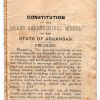calsfoundation@cals.org
Arkansas Workers’ Compensation Commission
The Arkansas Workers’ Compensation Commission is a quasi-judicial agency of the executive branch of Arkansas government, charged with the responsibility of administering the Arkansas Workers’ Compensation Law. Amendment No. 26 of the Arkansas Constitution, which was adopted by the people of the state in the general election held on November 8, 1938, created and gave constitutional authority for the organization and operation of the commission. The amendment provides that the Arkansas General Assembly shall have the power to enact laws prescribing the amount of compensation to be paid by employers for injuries to or death of employees; to pay restitution to the spouses and children of the deceased workers; and to provide the means, methods, and forum for adjudicating claims under the law.
Pursuant to the constitutional authority, the people of Arkansas, acting under the Initiated and Referendum Amendment (Amendment 7) to the Arkansas Constitution, adopted Initiated Act No. 4 of 1948, known as the Workers’ Compensation Law. The act, together with subsequent amendments and various Arkansas court rulings, now makes up the workers’ compensation law of the state of Arkansas.
The three-member Arkansas Workers’ Compensation Commission is responsible for the administration of the workers’ compensation law in Arkansas. The commissioners are appointed by the governor for a term of six years, with one commissioner representing labor, one representing management, and the chairman acting as a neutral party, representing the interests of the public.
The administrative and regulatory functions of the commission include monitoring all claims and benefit payments to injured workers; processing settlements, lump-sum payments, and requests for changes of physicians; ensuring that employers maintain required insurance coverage; approving applications of employers to act as self-insurers; and participating in programs to explain the function of the commission to the general public.
The divisions of the Arkansas Workers’ Compensation Commission are as follows:
1) Adjudication: This division, staffed by eleven administrative law judges and their support staff, has the function and responsibility to see that the primary purpose of the workers’ compensation laws is accomplished.
2) Administrative Services: The Workers’ Compensation Commission is not a general revenue agency but instead receives funding from a premium tax (limited by law to three percent) on workers’ compensation premiums paid by insurance companies writing workers’ compensation policies, companies qualifying as self-insurers, and all public employers. The Fiscal Section of this division disburses these funds. In addition, all purchasing, accounting, investments, travel, and budget analyses are the responsibility of this division.
3) Clerk of the Commission: The clerks’ office was established to serve as a conduit for the filing, processing, and internal routing of pleadings, legal documents, and other notices received by the commission.
4) Data Processing: This division is responsible for the automation of the commission. The division developed a system that captures data from the inception of a claim and maintains and updates this data throughout the life of a claim.
5) Health and Safety: Act 796 of 1993 created this division, which serves as a resource center of safety issues pertinent to employers and employees in Arkansas.
6) Legal Advisor: This division’s attorneys provide legal information and assistance to interested parties who have questions concerning Arkansas’s workers’ compensation law.
7) Medical Cost Containment: The major function of this division is to oversee the Medical Fee Schedule, which limits the reimbursement to providers for treatment rendered to injured workers and also to administer the Comprehensive Managed Care Program.
8) Operations and Compliance: This division is concerned primarily with the processing of compensation claims filed directly with the commission by parties other than the employer, receiving and establishing files for all First Reports of Injury, and monitoring insurance carriers via report cards. In addition, this division serves as the investigative arm of the agency.
9) Self-Insurance: This division is responsible for the administration and regulation of the Self-Insurance Program. The division processes the applications for individual self-insurance, group self-insurance, group members, and applications for third-party administrators.
10) Special Funds: This division comprises two individual funds: the Second Injury Trust Fund and the Death and Permanent Total Disability Trust Fund. Pursuant to Act 1415 of 2007, no new claims could be filed with the Second Injury fund on or after January 1, 2008. The Death and Permanent Total Disability Trust Fund pays weekly benefits to permanent and totally disabled workers or dependents of the workers after the workers’ compensation insurer has reached the cap of its indemnity liability.
11) Support Services: The prime focus of this division is to provide information to the public concerning workers’ compensation in Arkansas and to support to the Arkansas Workers’ Compensation Commission.
Created as part of the Transformation and Efficiencies Act of 2019 (Act 910), which sought to reduce the number of cabinet-level agencies in Arkansas state government by 65%, the new “umbrella department” called the Arkansas Department of Labor and Licensing (ADLL) consolidated a number of agencies and commissions that had previously reported directly to the governor, including the Arkansas Workers’ Compensation Commission. Act 910 transformed the former Arkansas Department of Labor into the Division of Labor, one of three divisions under the Arkansas Department of Labor and Licensing reporting to the new Secretary of Labor and Licensing. The three departmental divisions are the Division of Labor, the Arkansas Workers’ Compensation Commission, and the Division of Occupational and Professional Licensing Boards and Commissions.
For additional information:
Arkansas Workers’ Compensation Commission. http://www.awcc.state.ar.us/ (accessed September 1, 2021).
Leveritt, Mara. “Twice the Pain.” Arkansas Times, July 16, 1999, pp. 10–13.
Jim Kennedy
Arkansas Workers’ Compensation Commission







Comments
No comments on this entry yet.